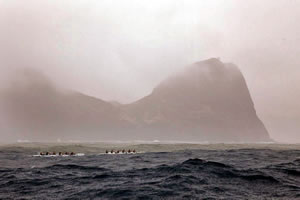Three Days, Three Islands, 90 Miles
Critics said it could not be done, but the believers believed.The Olamau Race was billed as the Ultimate Unlimited Outrigger Canoe Challenge in Hawaii – three days, three islands and nearly 90 miles.
“Personally, it’s exhilarating that we pulled it off,” says race director Mike Nakachi. “It was hands down the most challenging canoe race in the world. The conditions all three days were crazy. We were in the middle of a storm that brought flash floods, hail, gale warnings, 22- to 25-foot seas, and telephone poles were even snapping on Molokai in the wind.”
Up for grabs was a mind-boggling $50,000 in prize money. But cash wasn’t the only draw. Those who participated in the inaugural event said the thrill of breaking boundaries is what inspired them to take on the unknown.
The race was open to “open” vessels. There were no length, weight or design restrictions on the canoes except that no sails, solar or any other artificial means of propulsion were allowed.
Canoes were required to have an ama and only outrigger paddles were permitted.
Each team could have a maximum of nine paddlers with six paddlers participating in each leg of the race. No changes to paddler personnel were permitted during the race.
It was an “iron” race. Twelve teams started the challenge. Crews were from Hawaii, Southern California and the Pacific Northwest. The first leg was set to take paddlers nearly 22 miles from Maliko Gulch to Flemings Beach on Maui. But brutal conditions including 10 foot-plus seas forced the course to end at Napili Bay.
Day two brought even more challenges. The race started at Napili Bay on Maui and ended at Kaunakakai on Molokai. It was 26-plus miles and another day of unpredictable seas.
The final leg from Kaunakakai, Molokai, to Duke Kahanamoku Beach at Hilton Hawaiian Village was set for Saturday morning. But Mother Nature had other plans.
“The U.S. Coast Guard confirmed that a gale force warning was in effect Friday night,” says Nakachi. “We made the decision to delay the race for 24 hours. Seas on Saturday were 22 to 25 feet. We thought there’s no way it would calm down by Sunday.”
But it did. Early Sunday, crews left Molokai for the 40-mile race to Waikiki. Seas in the Kaiwi Channel had “mellowed” to 12 to 18 feet. And in the end, Team Primo of Hawaii had the best combined times in all three legs.
“We were stoked that Primo used the Ka’apahu,” says canoe builder Luke Evslin of Kamanu Composites. “Though it also made us nervous, since they were hands-down the most favored crew to win, it puts a lot of pressure on the canoe to perform.”
In fact, three canoes built by Evslin’s group finished in the top five: Ka’apahu (Primo), Kapa’a (Hui Lanakila), Kawainui (Lanikai).
“The race felt like we were seeing a snapshot of the future of outrigger canoeing,” says Evslin. “The evolution of the canoe was put on hold for the last 50 years, but now with races like Olamau and ‘Eono, it’s been kick-started again. The first unlimited race (2010 ‘Eono) had three unlimited canoes built by two builders. Now we have 10 unlimited canoes built by four builders.”
Evslin says it takes more than 400 hours of highly skilled labor to build these high-tech canoes, which are about 200 pounds lighter than most fiberglass canoes. Each is drastically different which adds a new level of excitement and unpredictability.
“The distance, the prize money and the adventure of the race are unprecedented. I think all of us who didn’t do it are drooling to get in next year,” says Evslin.
“The whole focus of Olamau was to create an America’s Cup atmosphere and allow people to push the envelope,” says Nakachi, “to be lighter, go faster and challenge their minds and bodies. We accomplished that, and as far as the prize money, the $50,000 could be doubled in 2013!”
Critics are still out there, but there are more believers now than ever before.
Olamau Race results:
1) Team Primo $26,000
2) Livestrong No. 1 $8,500
3) 404Simple Mobile No. 1 (Southern California) $6,500
4) Lanikai Canoe Club $3,000
5) Hui Lanakila $1,000




